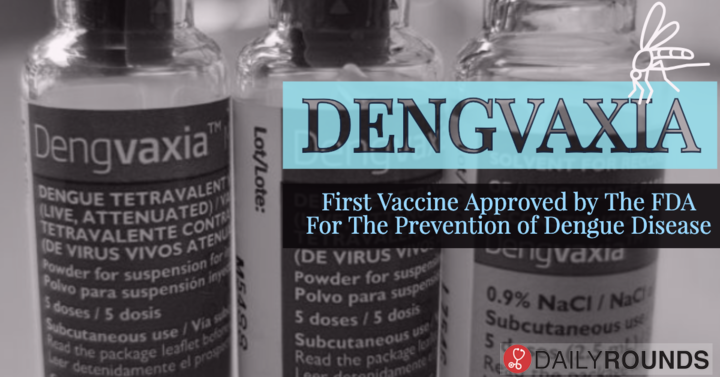
Dengvaxia: First Vaccine Approved by The FDA For The Prevention of Dengue Disease
 The FDA announced the approval of Dengvaxia, the first vaccine approved for the prevention of dengue disease caused by all dengue virus serotypes (1, 2, 3 and 4) in people who have laboratory-confirmed previous dengue infection and who live in endemic areas.
The FDA announced the approval of Dengvaxia, the first vaccine approved for the prevention of dengue disease caused by all dengue virus serotypes (1, 2, 3 and 4) in people who have laboratory-confirmed previous dengue infection and who live in endemic areas.
PRODUCT DESCRIPTION:
Dengvaxia is a live, attenuated, tetravalent, chimeric virus vaccine, containing the replication genes and the capsid gene from the attenuated Yellow Fever [17D] virus, and the Pre-M and ENV genes from each of the four dengue serotypes (CYD). Each CYD virus is purified from Vero cells.
INDICATION:
Dengvaxia is a vaccine indicated for the prevention of dengue disease caused by dengue virus serotypes 1, 2, 3 and 4 in individuals 9 through 45 years of age with laboratory-confirmed previous dengue infection and living in endemic areas. Previous dengue infection can be assessed through a medical record of a previous laboratory-confirmed dengue infection or through current serotesting.
DOSAGE & ADMINISTRATION:
Dengvaxia is supplied as a vial of lyophilized powder containing each of the four CYD virus components that is reconstituted at the time of use with the supplied diluent (0.4% NaCl). After reconstitution, each 0.5-mL dose of Dengvaxia is formulated to contain 4.5 – 6.0 log10 CCID50 of each of the CYD virus components. The reconstituted vaccine is administered.
Dengvaxia is a live, attenuated vaccine that is administered as three separate injections, with the initial dose followed by two additional shots given six and twelve months later.
ADVERSE EFFECTS:
The most commonly reported side effects by those who received Dengvaxia were headache, muscle pain, joint pain, fatigue, injection site pain, and low-grade fever. The frequency of side effects was similar across Dengvaxia and placebo recipients and tended to decrease after each subsequent dose of the vaccine.
CONTRAINDICATION:
Dengvaxia is not approved for use in individuals not previously infected by any dengue virus serotype or for whom this information is unknown. This is because, in people who have not been infected with dengue virus, Dengvaxia appears to act as a first dengue infection – without actually infecting the person with wild-type dengue virus – such that a subsequent infection can result in severe dengue disease. Therefore, health care professionals should evaluate individuals for prior dengue infection to avoid vaccinating individuals who have not been previously infected by dengue virus. This can be assessed through a medical record of a previous laboratory-confirmed dengue infection or through serological testing (tests using blood samples from the patient) prior to vaccination.
THE PROBLEM STATEMENT:
The first infection with dengue virus typically results in either no symptoms or a mild illness that can be mistaken for the flu or another viral infection. A subsequent infection can lead to severe dengue, including dengue hemorrhagic fever (DHF), a more severe form of the disease that can be fatal. Symptoms may include stomach pain, persistent vomiting, bleeding, confusion and difficulty breathing. Approximately 95 percent of all severe/hospitalized cases of dengue are associated with second dengue virus infection. Because there are no specific drugs approved for the treatment of dengue disease, care is limited to the management of symptoms.
THE STUDIES:
The safety and effectiveness of the vaccine were determined in three randomized, placebo-controlled studies involving approximately 35,000 individuals in dengue-endemic areas. The vaccine was determined to be approximately 76% effective in preventing symptomatic, laboratory-confirmed dengue disease in individuals 9 through 16 years of age who previously had laboratory-confirmed dengue disease. Dengvaxia has already been approved in 19 countries and the European Union.
To read more about the vaccine visit the following links: https://www.fda.gov/media/120939/download